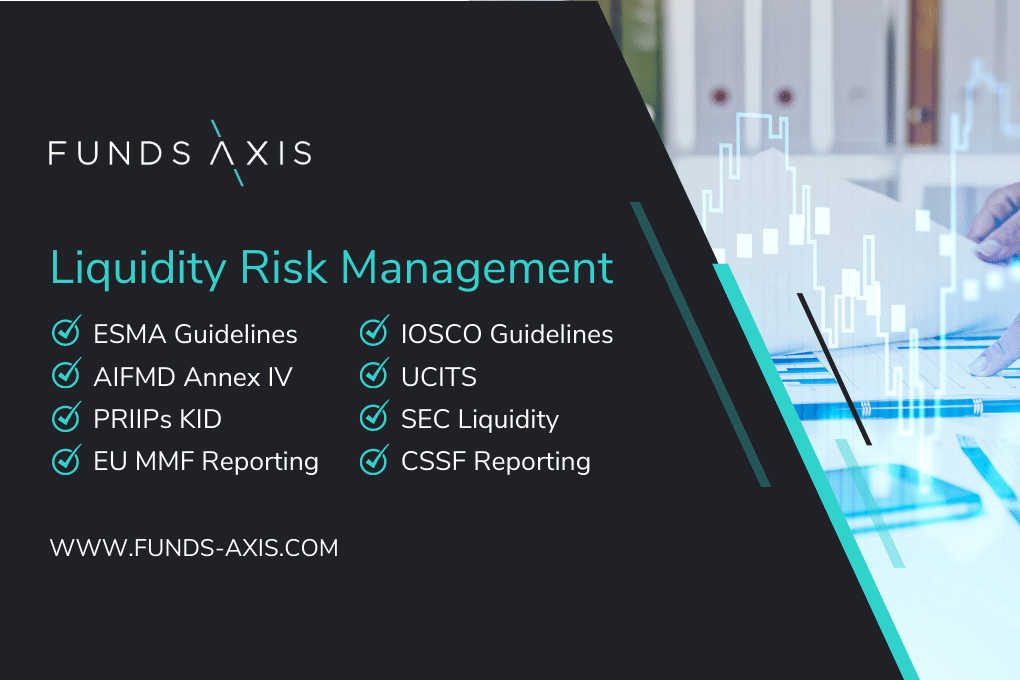The past month brought important developments on topics such as fund liquidity, costs and fees charged by fund managers, AIFMD, UCITS and Money Market Funds.
Most notably, in the UK, HM Treasury published the responses to the consultation on the Overseas Funds Regime, and the Financial Services Bill 2019-21 saw its second reading and is currently at committee stage.
See below this month’s regulatory round-up of some of the interesting regulatory developments we have tracked throughout November:
ESMA Publishes Report on the Recommendation of the ESRB on Liquidity Risk in Investment Funds
On 6th May 2020, the European Systemic Risk Board (ESRB) published a recommendation to address liquidity risk in investment funds. In response to the ESRB Recommendation, ESMA coordinated a supervisory exercise which included NCAs collecting data on funds exposed to corporate debt and to real estate.
On 12th November, ESMA published the report on the recommendations of the ESRB on liquidity risk in investment funds. The report sets out ESMA’s analysis and conclusions on the preparedness of the investment funds that were reviewed, and presents five priority areas identified to enhance the preparedness of funds that have significant exposures to corporate debt and real estate assets to potential future adverse shocks.
The following priority areas have been identified:
- Priority area 1 – Ongoing supervision of the alignment of the funds’ investment strategy, liquidity profile and redemption policy.
- Priority area 2 – Ongoing supervision of liquidity risk assessment.
- Priority area 3 – Fund liquidity profiles.
- Priority area 4 – Increase of the availability and use of liquidity management tools.
- Priority area 5 – Supervision of valuation processes in a context of valuation uncertainty.
ESMA Identifies Costs, Performance and Data Quality as New Priorities
Using its new convergence powers, ESMA has identified costs and performance for retail investment products, and market data quality as the strategic supervisory priorities for national competent authorities (NCAs).
In 2021, NCAs will undertake supervisory action coordinated by ESMA on the following:
- Costs and fees charged by fund managers; and
- Improving the quality of transparency data reported under MiFIR
The area of costs and performance is a key part of investor protection. ESMA considers that problems linked to cost and performance are multifaceted due to the lack of transparency and undue costs or differences observed in the application of certain MiFID requirements across Member States.
Unfair and disproportionate costs and fees can increase investor detriment and affect investors’ trust in financial markets. Investment firms and fund managers should have their clients’ best interests at heart and ensure that costs and charges are reasonable and disclosed in a transparent and non-complex manner.
Price competition and value for money are coming under increased scrutiny by EU and UK regulators. Funds-Axis’ Assessment of Value Solution, powered by whole-of-market data from FE fundinfo, provides firms with a comprehensive and efficient toolkit for conducting value assessments.
Our browser-based Assessment of Value Solution makes complex review and reporting quick and easy, with interactive and customisable dashboards, enabling firms to access and share key data at the click of a button.
ESMA Publishes First Report on Use of Sanctions under AIFMD
On 9th November, ESMA published its first annual report on the use by National Competent Authorities (NCAs) of sanctions under the Alternative Investment Fund Managers Directive (AIFMD).
During the 2019 reporting period, 13 NCAs imposed a total of 45 penalties; the total aggregated value of financial penalties imposed amounted to around EUR 9,000,000. 12 NCAs imposed a total of 42 measures. 14 NCAs did not impose any sanction (penalty or measure) during this reference period.
Broadly, the data gathered under the report shows that the sanctioning powers are not equally used among NCAs and, besides a few NCAs, the number and amount of sanctions issued at national level seems relatively low.
ESMA Publishes Third Annual Report on use of Sanctions for UCITS
On 12th November, ESMA published its 2019 report on the use of supervisory sanctions by National Competent Authorities (NCAs) under the Undertakings for Collective Investments in Transferrable Securities (UCITS) Directive.
The UCITS sanctions report contains an overview of the applicable legal framework and information on the penalties and measures imposed by NCAs in accordance with Article 99e of the UCITS Directive from 1 January 2019 to 31 December 2019.
Overall, 11 NCAs imposed a total of 43 penalties; the total aggregated value of financial penalties imposed amounted to around EUR 4,155,000. 9 NCAs imposed a total of 19 measures. 16 NCAs did not impose any sanction (penalty or measure) during the reference period.
ESMA consults on guidance for funds’ marketing communications
ESMA has launched a consultation on guidelines on marketing communications under the Regulation on facilitating cross-border distribution of collective investment undertakings.
The purpose of the draft guidelines is to specify the requirements for marketing communications sent to investors in order to promote UCITS and AIFs, including EuSEFs, EuVECAs and ELTIFs.
The requirements are that the material shall:
- Be identifiable as marketing material;
- Describe the risks and rewards of purchasing units or shares of an AIF or units of a UCITS in an equally prominent manner; and
- Contain information which is fair, clear and not misleading.
The consultation paper represents the first step in the development of these guidelines and sets out proposals on which ESMA is seeking the views of external stakeholders.
Second Reading of UK Financial Services Bill 2019-21
The Financial Services Bill 2019-21 was introduced in the House of Commons on 21st October 2020. The second reading was on 9 November 2020 and the Bill is currently at committee stage.
The Bill amends existing laws on financial services in 17 distinct areas. In brief, grouped by its three stated objectives, these areas are:
Objective 1: Enhancing the UK’s prudential standards and promoting financial stability
- Investment Firms Prudential Regime
- Implementation of Basel III
- LIBOR transition
- Benchmarks: extension of third-country transitional period
Objective 2: Promoting openness between the UK and overseas markets
- Gibraltar Authorisation Regime
- Overseas Funds Regime
- Markets in Financial Instruments Regulation (MiFIR)
Objective 3: Maintaining the effectiveness of the financial services regulatory framework and sound capital markets
- Cancellation of the authorisation of firms
- Amendments to the Market Abuse Regulation (MAR)
- Extending the maximum criminal sentence for market abuse
- Application of money laundering regulations to overseas trustees
- Debt Respite Scheme
- Successor accounts for Help-to-Save savers
- Amendments to the Packaged Retail and Insurance-based Investment Products (PRIIPS) Regulation
- Amendments to the European Markets Infrastructure Regulation (EMIR)
- Financial Collateral Arrangements
- Appointment of the FCA Chief Executive
HM Treasury Publishes Overseas Funds Regime Responses
On 13th November, the UK Government published responses to the consultation paper on the overseas funds regime (OFR). The proposal establish a more appropriate basis for recognising overseas funds, including EU UCITS and Money Market Funds. Under the proposed OFR it would comprise two separate new regimes:
- One for retail investment funds.
- One for MMFs.
Overall, the vast majority of consultation respondents were highly supportive of the proposed regime. They welcomed a streamlined and simplified process for marketing overseas funds to retail investors in the UK, compared to the current system under section 272 of the Financial Services and Markets Act 2000 (FSMA).
Central Bank of Ireland Publishes the Thirty-Sixth Edition of the AIFMD Q&A
On 23rd November 2020, the Central Bank of Ireland issued the 36th edition of the Central Bank AIFMD Q&A, which includes new Q&A IDs 1134 and ID 1135.
The Q&As concern a discontinuation of the practice of requiring general partners of investment limited partnerships to be approved by the Central Bank as AIF management companies.
Central Bank of Ireland Consultation Guidance on Share Class Features of Closed-Ended QIAIFs
The Central Bank of Ireland has published Consultation Paper 132 “Guidance on share class features of closed ended QIAIFs.”
In the Consultation Paper, the Central Bank of Ireland proposes changes to its AIF Rulebook concerning how certain rules are applied in the context of the share class structure for closed-ended AIFs.
The proposed updates to the Central Bank of Ireland rules on private funds coincide with the passing of the Investment Limited Partnership (Amendment) Bill 2020.
Responses to the CP must be submitted to the Central Bank by 22 December 2020.
IOSCO Reviews Money Market Funds Recommendations
IOSCO has published a diagnostic report analysing the events that occurred in the Money Market Funds (MMFs) sector during the market turmoil in March 2020. Additionally, IOSCO has published a thematic review assessing the implementation of selected IOSCO recommendations issued in 2012 to strengthen the resilience of MMFs globally.
The recommendations accessed in the Thematic Review include:
- Recommendation 4 – Use of fair value and amortized cost method
- Recommendation 5 – Third parties to review MMFs’ valuation practices
- Recommendation 6 – MMFs’ policies and procedures to know their investors
- Recommendation 7 – Minimum level of liquid assets
- Recommendation 8 – Stress testing
- Recommendation 9 – Tools to deal with exceptional market conditions & substantial redemption pressure
- Recommendation 10 – Safeguards towards stable NAV MMF or conversion to variable NAV
CSSF Updates UCITS and AIFMD FAQs
On 24th November 2020, the Commission de Surveillance du Secteur Financier (CSSF) published an updated FAQ concerning:
- Luxembourg Law of 17 December 2010 relating to undertakings for collective investment; and
- Luxembourg Law of 12 July 2013 on alternative investment fund managers.
The updated question in both FAQs is as follows:
Q: What are the conditions to comply with in case of data transfer by a central administration or a depositary to another service provider?
A: Pursuant to Article 41 (2a) of the amended Law of 5 April 1993 on the financial sector, in case a central administration agent or a depositary (a credit institution, an investment firm or a professional of the financial sector) is outsourcing services implying a transfer of relevant information to a third party, the central administration agent or the depositary must ensure that its client, the Board of Directors (“BoD”) of the SICAV or of the IFM for common funds, has accepted the outsourcing of the relevant outsourced services, the type of information transmitted in the context of the outsourcing and the country of establishment of the entities that provide the outsourced services.
Any transfer of information related to investors should be disclosed prior to the transfer, by the UCI, respectively the IFM for common funds, to investors through appropriate means, namely the prospectus and the application form combined, if appropriate, with a reference to a website. Existing investors should be informed by the UCI, respectively the IFM for common funds, prior to the transfer of their information, about any update of the fund documents aiming at the aforesaid disclosure by means of a letter, email or any other means of communication provided for by the prospectus.
Due to transparency and confidentiality requirements, the same conditions apply to UCI/IFM acting as central administration.
The aforesaid requirements apply independently from the General Data Protection Regulation (EU) 2016/679, if applicable.
SEC Charges Investment Advisor with Schedule 13D Reporting Violations
The SEC recently entered into an enforcement settlement with a registered investment adviser managing five private funds. The enforcement settlement concerns violations of the “beneficial ownership” reporting requirements of Section 13(d) of the Exchange Act.
According to the SEC’s order, in 2016, Welsh Carson, the investment manager of the private funds, began purchasing shares of Hanger Inc. for the purpose of acquiring the company and taking it private. The order found that, in July 2016, the funds had acquired 7% of Hanger’s outstanding common stock. The order also found that whilst the funds filed an initial Schedule 13D, it subsequently failed to file timely Schedule 13D amendments as required on two separate occasion.
Without admitting or denying the SEC’s findings, Welsh Carson agreed to a cease and desist order and to pay a penalty of $100,000.
Request A Demo
Error: Contact form not found.

















